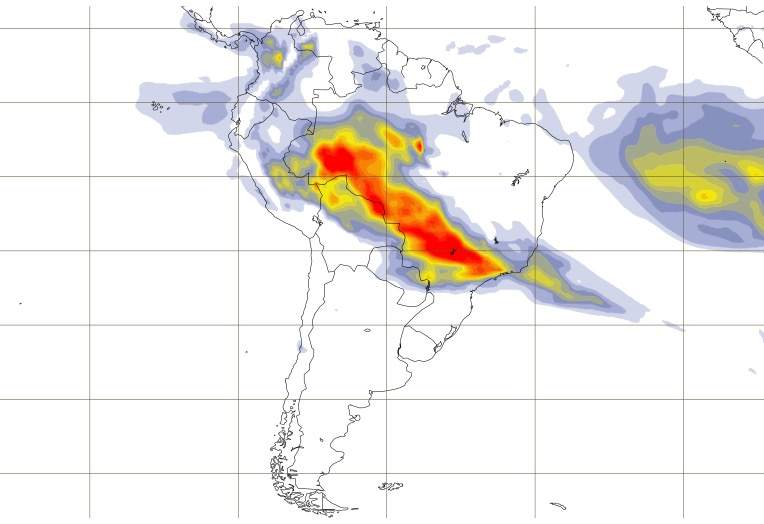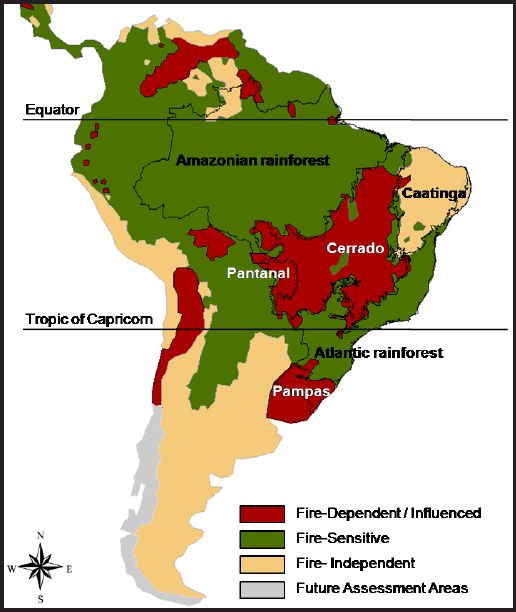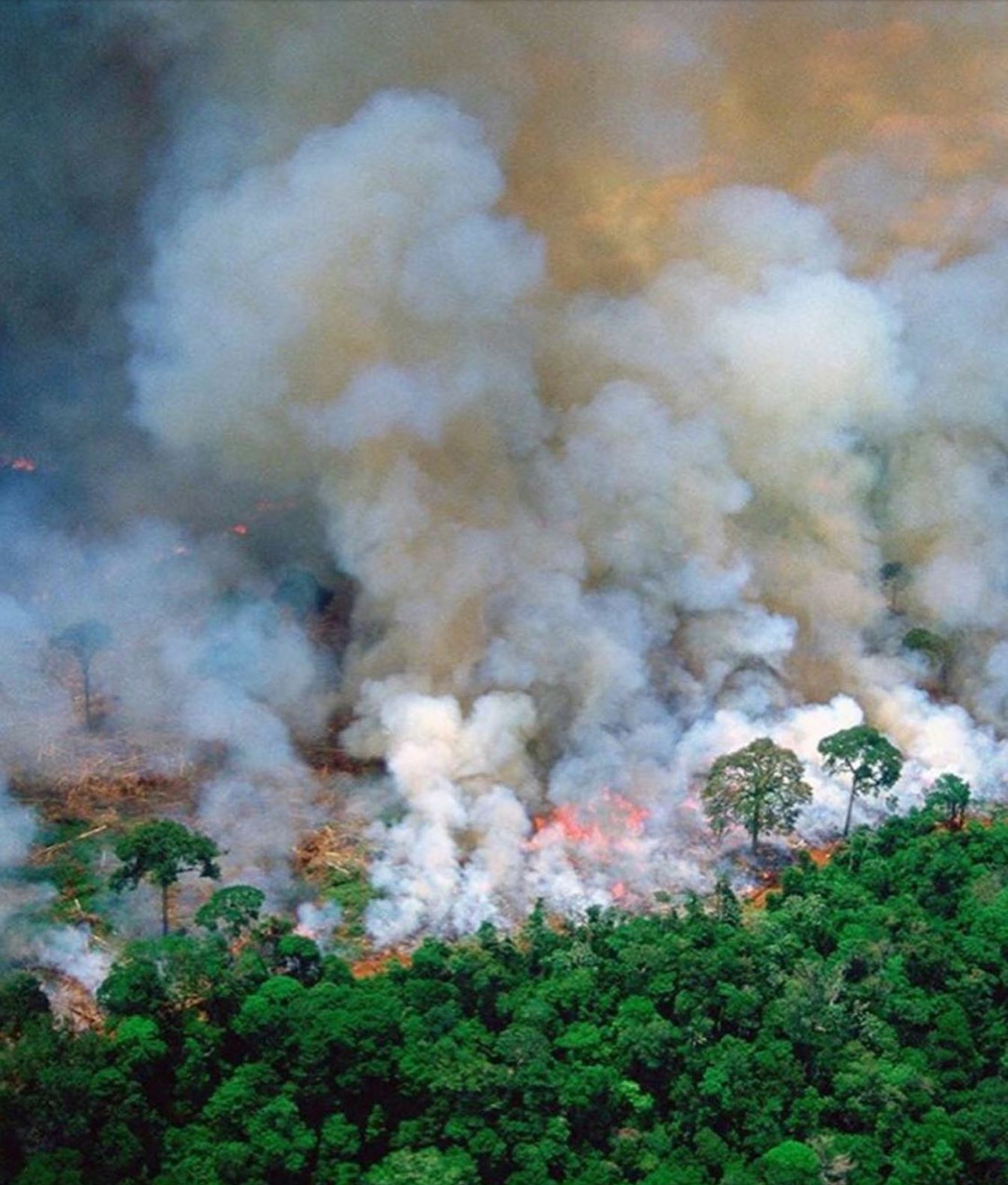It looks like you're using an Ad Blocker.
Please white-list or disable AboveTopSecret.com in your ad-blocking tool.
Thank you.
Some features of ATS will be disabled while you continue to use an ad-blocker.
share:
originally posted by: LSU2018
a reply to: 2012newstart
Is your cry of global warming satire? Please tell me it's satire.
i dont know, as if global worming starts a fire on its own
originally posted by: 2012newstart
a reply to: whiteblack
hundreds of thousands species if not millions in Amazon...but the impact will be on the whole planet and very soon. Only a miracle can save us. Hope that miracle happens
A miracle like a Grand Solar Minimum?
originally posted by: Dr UAE
originally posted by: LSU2018
a reply to: 2012newstart
Is your cry of global warming satire? Please tell me it's satire.
i dont know, as if global worming starts a fire on its own
It's definitely hotter than normal, but that's the cycle we're in with Earth. What's crazy is that nothing we do will stop the warming. The people with their hearts set on stopping global warming are so stupid when it comes to stopping it, that their actions - if successful - would hurry the warming. The doom porn scientists aren't paid for solutions, they're paid to find a reason, any reason.
Nah, it's not good for us. The trees will grow back long after we are gone.
originally posted by: conspiracy nut
this can't be good for the earth! i will be following this story. heartbreaking!
a reply to: 2012newstart
Is it possible this has been sensationalized?
Brazil's Amazon Is Being Scorched By A Record Number Of Wildfires

Aerosol forecasts

The Use of Fire in the Cerrado and Amazonian Rainforests of Brazil: Past and Present
Looks to me like there is some overlap between the areas in which the fires are reported and areas in which the forest is fire-dependent.
Is it possible this has been sensationalized?
There is nothing abnormal about the climate this year or the rainfall in the Amazon region, which is just a little below average," INPE researcher Alberto Setzer told Reuters.
"The dry season creates the favorable conditions for the use and spread of fire, but starting a fire is the work of humans, either deliberately or by accident."
In a statement published on Friday, NASA reports overall fire activity in the Amazon is a little below the 15-year average. But notes activity has been above average in the states Amazonas and (to a lesser extent) Rondônia.
Brazil's Amazon Is Being Scorched By A Record Number Of Wildfires

Biomass burning aerosol optical depth at 550 nm (provided by CAMS, the Copernicus Atmosphere Monitoring Service)
Tuesday 20 Aug, 00 UTC T+12 Valid: Tuesday 20 Aug, 12 UTC
Aerosol forecasts
According to their associations with fire, Hardesty et al. (2005) classified the world’s ecosystems as fire-independent, fire-sensitive, and fire-dependent. In fire-independent ecosystems, fire never or very rarely happens either because climatic conditions do not permit it (too dry, too wet, or too cold), or because there is not enough biomass to carry a fire. Fire-sensitive ecosystems are damaged by fire that disrupts ecological processes, kills many individuals, or even eliminates species in such ecosystems that have not evolved under this selective force. In contrast, fire-dependent ecosystems evolved in the presence of periodic or episodic fires and depend on them to maintain their ecological processes; species are fire-adapted, flammable, and fire-maintained, and fires are recurrent.

Fire-sensitive, fire-dependent, and fire-independent vegetation in South America, highlighting the Brazilian biomes (Amazon rainforest, Cerrado, Caatinga, Pantanal, Atlantic rainforest, Pampas) (Hardesty et al. 2005).
The Use of Fire in the Cerrado and Amazonian Rainforests of Brazil: Past and Present
Looks to me like there is some overlap between the areas in which the fires are reported and areas in which the forest is fire-dependent.
originally posted by: EmmanuelGoldstein
Fire's are good for forests. Forests like them.
Everything grows back with improved vigor. All that nitrogen from the ashes.
Plants love that sh!t.
My concern is that it’s brazil. They’ll find someway to royally screw this up.
a reply to: 2012newstart
Christ..
Stop the world, I want to get off.
Hope this does not turn into another Sahara... worldly resources better be on focus here.
Christ..
Stop the world, I want to get off.
Hope this does not turn into another Sahara... worldly resources better be on focus here.

For some perspective on the area burned by these fires.
One square acre is approximately 208ft by 208ft.
One square quarter mile is 40 acres (about your average four city blocks).
One square mile is approximately 640 acres (around 64 city blocks).
640 million acres are ablaze. If one square mile = 640 acres, then there are one million square miles burning.
One square acre is approximately 208ft by 208ft.
One square quarter mile is 40 acres (about your average four city blocks).
One square mile is approximately 640 acres (around 64 city blocks).
640 million acres are ablaze. If one square mile = 640 acres, then there are one million square miles burning.
edit on 21-8-2019 by MichiganSwampBuck because: For Clarity
It’s to grow grasses in the ashes.
The grasses feed cattle for a year or two.
Burgers and corned beef, for the masses from the grasses in the ashes.
Then you have to move on, burn down more trees because the forest soil is very poor, except for the fresh ashes.
It’s not sustainable , and it’s almost impossible to recreate the original environment.
The grasses feed cattle for a year or two.
Burgers and corned beef, for the masses from the grasses in the ashes.
Then you have to move on, burn down more trees because the forest soil is very poor, except for the fresh ashes.
It’s not sustainable , and it’s almost impossible to recreate the original environment.
He says the fires are needed for farmers to do their jobs properly and grow food, to feed their people... do you even understand how that process
works? My guess no. You are just responding to climate peril news. Everyone cares about the planet, and no climate legislation has ever done a drop
of good to help stop pollution.
Let's look at the solutions proposed by those most upset by "climate" Raising tax revenue and controlling how resources are used. Hmm... so authoritarianism is the solution to climate change? Huh... a reply to: 2012newstart
Let's look at the solutions proposed by those most upset by "climate" Raising tax revenue and controlling how resources are used. Hmm... so authoritarianism is the solution to climate change? Huh... a reply to: 2012newstart
While the destruction to the Amazon is tragic enough, something I don't see a lot of people talking about is the fact that this is essentially state
sanctioned, agribusiness funded, genocide.
Or do the indigenous peoples of the Amazon not count?
Or do the indigenous peoples of the Amazon not count?
a reply to: 2012newstart
We are our own worst enemies. For a species with so much intelligence we are stupid. Either that or we are just stupid.
We are our own worst enemies. For a species with so much intelligence we are stupid. Either that or we are just stupid.
Notre Dame burns and there is no stop media coverage and billionaires pledging to rebuild it.
The lungs of our planet is burning and there is almost no media coverage and no aristocrats pledging to help restore it.
Humanity is doomed.
The lungs of our planet is burning and there is almost no media coverage and no aristocrats pledging to help restore it.
Humanity is doomed.
originally posted by: jadedANDcynical
a reply to: 2012newstart
Is it possible this has been sensationalized?
There is nothing abnormal about the climate this year or the rainfall in the Amazon region, which is just a little below average," INPE researcher Alberto Setzer told Reuters.
"The dry season creates the favorable conditions for the use and spread of fire, but starting a fire is the work of humans, either deliberately or by accident."
In a statement published on Friday, NASA reports overall fire activity in the Amazon is a little below the 15-year average. But notes activity has been above average in the states Amazonas and (to a lesser extent) Rondônia.
Brazil's Amazon Is Being Scorched By A Record Number Of Wildfires
Biomass burning aerosol optical depth at 550 nm (provided by CAMS, the Copernicus Atmosphere Monitoring Service)
Tuesday 20 Aug, 00 UTC T+12 Valid: Tuesday 20 Aug, 12 UTC
Aerosol forecasts
According to their associations with fire, Hardesty et al. (2005) classified the world’s ecosystems as fire-independent, fire-sensitive, and fire-dependent. In fire-independent ecosystems, fire never or very rarely happens either because climatic conditions do not permit it (too dry, too wet, or too cold), or because there is not enough biomass to carry a fire. Fire-sensitive ecosystems are damaged by fire that disrupts ecological processes, kills many individuals, or even eliminates species in such ecosystems that have not evolved under this selective force. In contrast, fire-dependent ecosystems evolved in the presence of periodic or episodic fires and depend on them to maintain their ecological processes; species are fire-adapted, flammable, and fire-maintained, and fires are recurrent.
Fire-sensitive, fire-dependent, and fire-independent vegetation in South America, highlighting the Brazilian biomes (Amazon rainforest, Cerrado, Caatinga, Pantanal, Atlantic rainforest, Pampas) (Hardesty et al. 2005).
The Use of Fire in the Cerrado and Amazonian Rainforests of Brazil: Past and Present
Looks to me like there is some overlap between the areas in which the fires are reported and areas in which the forest is fire-dependent.
Now who on earth would benefit from sensationalizing this as an apocalyptic record setting fire, whose fault rests with one side of the political spectrum? Hmmm.
originally posted by: 2012newstart
The time is very short. According to many experts we have the time of 16 more months to act decisively. September 23 meeting in the UN will decide the further action ...I pray and hope this time it will be ACTION AND NOT TALKS!!!
But if Brazil and others keep burning forests, we may not have even those 16 months...
You know what? Since we all know nothing is going to change in those 16 months, I'm going to call bluffs and flip the tables on you. You and anthropomorphic global climate change are now on the clock... you've got 16 months to metaphorically take a crap or GTF off the pot. In 16 months, when nothing has changed and locations around the globe are still experiencing normal days mixed with record high days mixed with record low days mixed with dry periods mixed with wet periods and all happening same as it always has with the only constant being the fact that the weather always changes, it needs to serve as an eye opener to the planet to turn, en masse, at these taxed wealth driven fear pimps, these power whores in governments and lobby groups who have used these scare tactics and brainwashing stunts to con many into losing sleep over the pending devestation of our planet, these ministers of BS who have turned climate alarmism into the new doomsday cult, worshipping at the altar of the Algea publicly just before using the rest of the service to pass the collection plate and lock the doors until their congregation has emptied their entire resources into it, and tell them loudly to STFU and move along.
Global Warming's clock is ticking, it's reckoning is nigh.
originally posted by: jrod
Notre Dame burns and there is no stop media coverage and billionaires pledging to rebuild it.
The lungs of our planet is burning and there is almost no media coverage and no aristocrats pledging to help restore it.
Humanity is doomed.
Earth doesn't grow a new, constructed Notre Dame within a year of the previous one burning to the ground. Trees aren't a finite resource.
originally posted by: MichiganSwampBuck
640 million acres are ablaze. If one square mile = 640 acres, then there are one million square miles burning.
Where in the blue hell did you get 640 million acres on fire from?
The entire damn Amazon forest is only 2.1 million square miles. Do you honestly believe half of it has burned in the past year? Really?
The month of July saw a supposed single month record of 519 square miles. That's 332,000 Acres. The state of Alaska has seen 2.5 million acres burned so far in this year's fire season. That's about twice our usual, but it's been a dry summer. Anyway, my point here is that you're overdramatizing numbers by MASSIVE amounts. If the planet had a million square miles on fire at one time, it would be a bit more concerning than this actually is.
edit on 22-8-2019 by burdman30ott6 because: (no reason given)
originally posted by: burdman30ott6
originally posted by: MichiganSwampBuck
640 million acres are ablaze. If one square mile = 640 acres, then there are one million square miles burning.
Where in the blue hell did you get 640 million acres on fire from?
The entire damn Amazon forest is only 2.1 million square miles. Do you honestly believe half of it has burned in the past year? Really?
The month of July saw a supposed single month record of 519 square miles. That's 332,000 Acres. The state of Alaska has seen 2.5 million acres burned so far in this year's fire season. That's about twice our usual, but it's been a dry summer. Anyway, my point here is that you're overdramatizing numbers by MASSIVE amounts. If the planet had a million square miles on fire at one time, it would be a bit more concerning than this actually is.
That was the quote from the other post that was closed. I never looked into it, but I thought that the figure of 640 million was way over the top, so I converted acres into square miles basically to show that was an insane number. I should have made that clear, but it doesn't change what I said about acres to miles comparisons.
Here's the facts as Snopes tells it.
There have been a total of 72,843 fires in Brazil this year, with more than half in the Amazon region, INPE said. That’s more than an 80% increase compared with the same period last year.
While Brazil’s National Institute for Space Research recorded its highest rate of fires in Brazil since it started recording in 2013, NASA found that the total fire activity in the Amazon basin was actually slightly below average when compared to the last 15 years:
The NY Times makes this statement about the fires.
Data released by Brazil’s National Institute for Space Research shows that from January to July, fires consumed 4.6 million acres of the Brazilian Amazon, a 62 percent increase compared to last year.
Seems like everyone has different figures for the area of the Amazon that has been consumed by fire. No one seems to have the amount of area burned in August and the photos being shown are from fires in past years, not from the current fires.
edit on 22-8-2019 by MichiganSwampBuck because: For
Clarity
new topics
-
How To Spot Fake U.F.O. Photos
Aliens and UFOs: 10 hours ago
top topics
-
LA Mayor Bass Demanded $49M in Additional LAFD Cuts One Week Before Wildfires
Mainstream News: 16 hours ago, 17 flags -
Just Came Across These Unusual Old UFO Pics
Aliens and UFOs: 14 hours ago, 7 flags -
Scary video of face in an abandoned house
Paranormal Studies: 12 hours ago, 5 flags -
How To Spot Fake U.F.O. Photos
Aliens and UFOs: 10 hours ago, 5 flags -
Sepultura - Territory - With New Drummer Greyson Nekrutman
Music: 17 hours ago, 3 flags
active topics
-
Trump says ownership of Greenland 'is an absolute necessity'
Other Current Events • 175 • : Flyingclaydisk -
Judge rules president-elect Donald Trump must be sentenced in 'hush money' trial
US Political Madness • 123 • : Flyingclaydisk -
Just Came Across These Unusual Old UFO Pics
Aliens and UFOs • 7 • : devilhunter69 -
Oh, Good Gosh. “Kremlin Warns Stay Away from Greenland.”
World War Three • 35 • : Lazy88 -
Gravitic Propulsion--What IF the US and China Really Have it?
General Conspiracies • 40 • : Lazy88 -
Fire insurance in LA withdrawn months ago
General Conspiracies • 39 • : Flyingclaydisk -
Los Angeles brush fires latest: 2 blazes threaten structures, prompt evacuations
Mainstream News • 395 • : Flyingclaydisk -
Archbisop Vigano Warns of Deep State and Deep Church
New World Order • 12 • : FlyersFan -
This should be plastered all over the airwaves
Mainstream News • 56 • : Flyingclaydisk -
How To Spot Fake U.F.O. Photos
Aliens and UFOs • 4 • : SteamyAmerican
